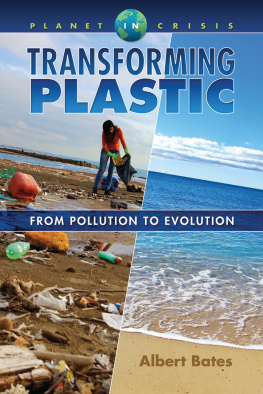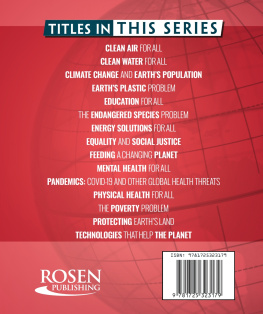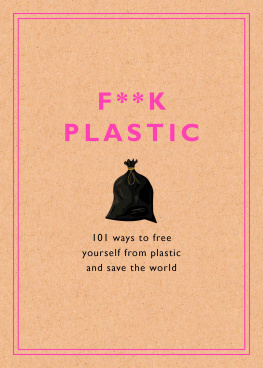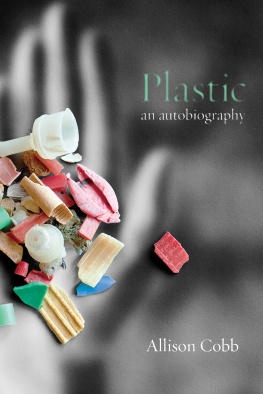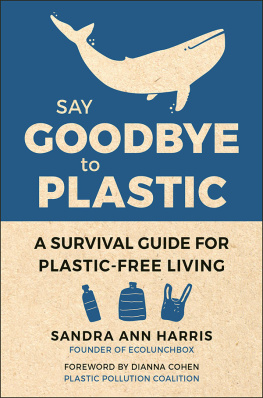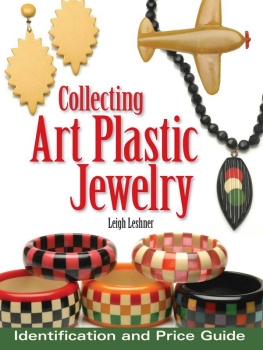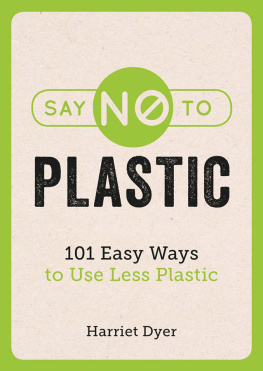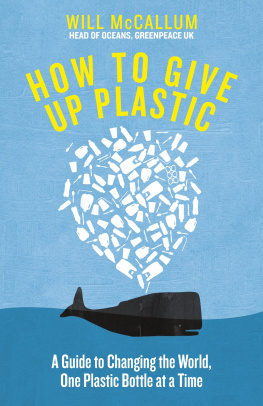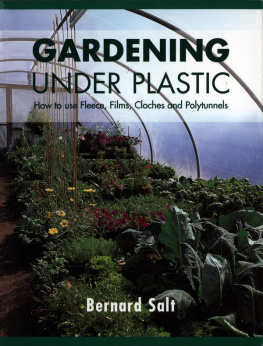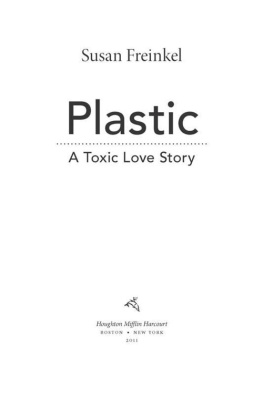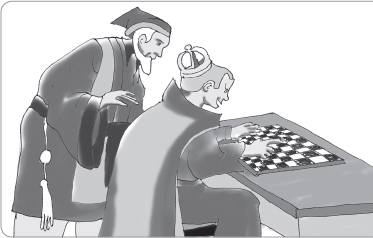
TRANSFORMING
PLASTIC
FROM POLLUTION TO EVOLUTION
Albert Bates
GroundSwell Books
Summertown, Tennessee
Library of Congress Cataloging-in-Publication Data
Names: Bates, Albert K., 1947- author.
Title: Transforming plastic : from pollution to evolution / Albert Bates.
Description: Summertown, Tennessee : GroundSwell Books, [2019] | Series: Planet in crisis | Includes bibliographical references.
Identifiers: LCCN 2019007472 | ISBN 9781570673719 (pbk.)
Subjects: LCSH: Plastic scrapEnvironmental aspects. | PlasticsRecycling. | PlasticsTechnological innovations.
Classification: LCC TD798 .B37 2019 | DDC 363.738dc23
LC record available at https://lccn.loc.gov/2019007472
We chose to print this title on sustainably harvested paper stock certified by the Forest Stewardship Council, an independent auditor of responsible forestry practices. For more information, visit us.fsc.org. | |
2019 Albert Bates
All rights reserved. No portion of this book may be reproduced by any means whatsoever, except for brief quotations in reviews, without written permission from the publisher.
Printed in the United States of America
GroundSwell Books
an imprint of Book Publishing Company
PO Box 99
Summertown, TN 38483
888-260-8458
bookpubco.com
ISBN: 978-1-57067-371-9
24 23 22 21 20 19 1 2 3 4 5 6 7 8 9
Contents
Acknowledgments
A ll books depend upon the contributions of many. For this book I began with the assistance of Gayla Groom, using Slack to share notes and Scrivener to aggregate our research, even as we both roamed the world, sometimes fourteen time zones apart. I was thankful to have Kindle while I was sitting in airports and train stations or riding on planes and trains. I am grateful to the authors of the many written works and interviews I consulted, but above all Susan Freinkel and Michael Tolinski who elevated the discussion above the usual dos and donts lists. The final edition was ported from Google Docs to Microsoft Word and cross-checked in Grammarly before going to the publisher. The costs of these tools and subscriptions are not paid for by advances or will even likely be repaid by royalties, so my gratitude goes to angels such as Ross Jackson, Geoff Oelsner, Ian Graham, Doug Guyer, and Bruce and Roslyn Moore, among many others who helped in ways large and small. In the editing process, Kathy Hill, Gayla Groom, and Jo Stepaniak turned a rough work into something more polished. Bob and Cynthia Holzapfel at Book Publishing Company provided ideas and encouragement from the outset, and when they needed to be patient with my delays, they were. Finally, I owe special thanks to Alexandre Lemille at Wizeimpact, Renate Dauvarte and team at The Ocean Cleanup, Anne-Sophie Garrigou at The Beam magazine, Pete Kelly at Okefenokee Glee & Perloo, Jason Deptula and Millie Kellems-Otto, Carolina Erminy, Veronica Valenzuela Gibson, Maria Martinez Ros, Sandra Thomson, and Leobardo Velazquez.
Introduction
M ost people come to this discussion having been moved by an image. Perhaps it was a sea turtle with a plastic straw in its nose, or a seal pup suffocating after getting tangled in a plastic bag. Maybe it was the corpse of a pelican or whale whose innards were packed with colorful plastic knickknacks. Perhaps you read a magazine article telling you that you now have microplastics in your kidneys and liver, as we all do, and as your children will, and their children. These things horrify us, and rightly so. They may make us angry, but do they empower us to do something?
I come to this subject from a dedication to regenerative system design. Whether teaching permaculture courses, working with bright young students at Gaia University, or building communities of the future with the Global Ecovillage Network, my strategy has always been to turn the amazing energy and creativity of youth toward creating a better future. After all, they have the most to lose, and if it is going to get better, theyll be the ones to make it so.
Plastics are a challenge that they will find very difficult to deal with, and theyre becoming more difficult to deal with each year.
I am an EPT: emergency planetary technician. This book is part of a series that examines each of the planetary crises we now face and offers a training course in emergency care. I believe that if many more people decide to join with me and become emergency planetary technicians, we have a decent chance of stabilizing the patient.
This book takes a look at the many problems of plastic, but it only sets the stage. Its main focus is on solutionsthings you can do, things governments must do, and things smart business leaders will do to turn profits. I will take you on the journey I took as I looked at the worlds current predicament and the various solutions that have been explored so far.
Now is not the best time to be dealing with this. Fifty or one hundred years ago would have been better. Some of the problems caused by plastics cant be fixed nowthey will be with us forever. But now is the second-best time to start, so lets go.
CHAPTER 1
Arithmetic
If a path to the better there be, it begins with a full look at the worst.
THOMAS HARDY
T he late University of Colorado mathematics professor Albert Bartlett is said to have given his famous lecture on the exponential function more than one thousand times. I show the YouTube video of that lecture at the start of my permaculture courses, and I suspect many other instructors do the same. The audience continues to grow each year since Bartlett passed. In his one-hour talk, the professor says:
Legend has it that the game of chess was invented by a mathematician who worked for a king. The king was very pleased. He said, I want to reward you. The mathematician said, My needs are modest. Please take my new chessboard and on the first square, place one grain of wheat. On the next square, double the one to make two. On the next square, double the two to make four. Just keep doubling till youve doubled for every square; that will be an adequate payment. We can guess the king thought, This foolish man. I was ready to give him a real reward; all he asked for was just a few grains of wheat.
But lets see what is involved in this. We know there are eight grains on the fourth square. I can get this number, eight, by multiplying three twos together. Its 2 2 2; its one two less than the number of the square. Now that continues in each case. So on the last square, Id find the number of grains by multiplying sixty-three twos together.
Now lets look at the way the totals build up. When we add one grain on the first square, the total on the board is one. We add two grains, that makes a total of three. We put on four grains, now the total is seven. Seven is a grain less than eight, its a grain less than three twos multiplied together. Fifteen is a grain less than four twos multiplied together. That continues in each case, so when were done, the total number of grains will be one grain less than the number I get multiplying sixty-four twos together. My question is, how much wheat is that?
Next page
